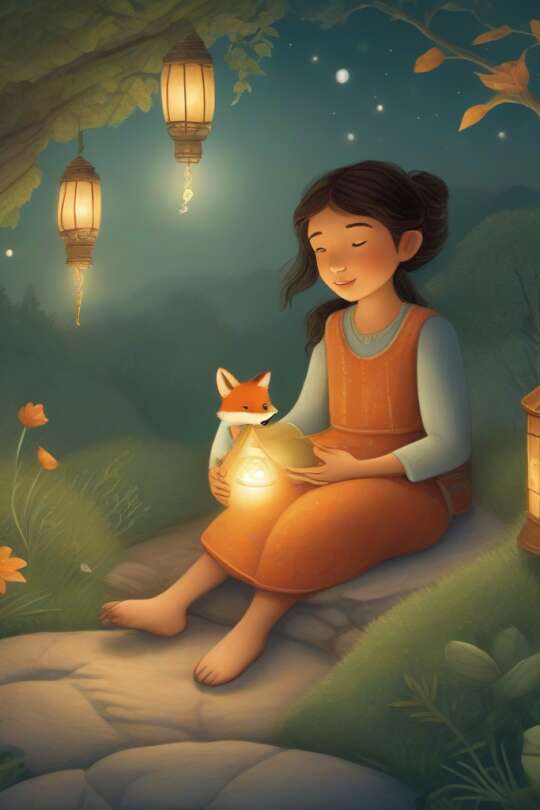
Mira and the Moon-Garden
About the Story
A gentle bedtime adventure about Mira, a curious child who follows moonlit lanterns into a secret garden to mend missing lullabies. With a quiet courage, a thimble compass, and a lantern-fox friend, she learns to help a lonely wind return songs and bring peaceful sleep back to her village.
Chapters
Related Stories
The Night Garden and the Quiet Song
Evening is too loud for Nora until a small glowing petal leads her into the Night Garden. Guided by a hush-bird and an old willow, she gathers the scattered pieces of a lost lullaby — a breath, a kindness, a remembered smile — and begins to mend the quiet around her pillow.
Juniper and the Moon's Missing Lullaby
A gentle bedtime tale about Juniper, a young apprentice at a rooftop library who follows threads of song, meets a lonely keeper, and restores a missing lullaby to the moon. Soft adventures, small acts of courage, and lessons about remembering and returning.
Finn and the Night Loom
A gentle seaside bedtime adventure about nine-year-old Finn who mends the Night Loom to restore the village's moonlit hush. Through small kindnesses, clever stitches, and unexpected friends, he learns the courage of caring and the quiet rewards of mending.
Etta and the Moon's Echo
Etta, a ten-year-old apprentice at the Sleep Library of Willowmere, follows a trail of missing night-songs into the Hush-Wrack. With a gift from a soundsmith and a glass bird named Lilt, she learns to teach a lonely hush how to ask instead of take, restoring the town's bedtime music.
The Lantern of Little Harbor
A gentle bedtime tale about a curious boy, a clockwork fox, and a shy creature who gathers lost things. When the lighthouse's prism goes missing, a small search becomes a lesson in kindness, promises, and the quiet bravery that keeps a harbor safe.
Ratings
Reviews 5
Mira and the Moon-Garden is a neatly crafted bedtime fable. The author nails sensory detail: the creak-as-lullaby motif, the kettle’s double sigh, the cotton ear on Mote standing proud—those touches anchor the fantasy in a believable domesticity. Structurally, the journey is short and purposeful: a child notices a gap (missing lullabies), follows the moonlit cue (the tapping at the window, the glimmer in the willow), meets small helpers (lantern-fox, thimble compass), and performs an act of kindness that restores the village’s sleep. For ages 7–11 this is spot on—there’s sufficient adventure without high stakes, and the pacing keeps the quiet tone intact. If I had a quibble it’s that a few elements (how the thimble compass works, the wind’s backstory) are hinted at rather than explored, but that brevity also preserves the story’s cozy mystique. A thoughtful bedtime read.
I wanted to love this because the premise is lovely, but it left me wanting more depth. The opening domestic details are charming—the kettle, the folded blanket, Pip at the sill—but once Mira follows the glimmer, the plot moves into predictable territory. The lantern-fox and thimble compass are cute, but they feel like window dressing rather than plot drivers; the mechanics of how Mira ‘mends’ lullabies aren’t explained convincingly, and the lonely wind doesn’t get enough backstory to make its resolution satisfying. The pacing is uneven: long, dreamy description at the start, then a rush to tidy up the village’s sleep. For a bedtime tale that aims for emotional heft, the ending felt too neat—like someone smoothed the wrinkles without really working them out. It’s a pleasant read for a single quiet night, but not one that lingers or invites rereading for deeper meaning.
Cute, cozy, and a little bit mischievous — I grinned through the lantern-fox parts. The image of Mira pressing her forehead to the glass while the tapping asks permission is just chef’s-kiss perfect for a bedtime story. The thimble compass is delightfully quirky (where do authors come up with these things?), and Mote’s patched ear had me going “awww” out loud. Not much happens in terms of big action, but that’s the point: it’s a soft, slow adventure for settling down. If you want something high-drama, nope — but if you want to drift off with a smile, this is it. Tiny nitpick: I wanted just a touch more on why the wind lost songs, but hey — leaves some mystery. 🙂
Honestly, this was a bit too twee for my taste. Mira and the Moon-Garden hits all the cozy checkpoints—lavender, mended stuffed lamb, moonlit willow—but it flirts with clichés (the wise Mama with the perfect lullaby, the plucky child who ‘fixes’ everything) and never really pushes past them. The tapping at the glass and the lantern-fox are visually sweet, but the story skirts around real stakes: why did sleep go missing? Why is the wind lonely now? The thimble compass is a fun prop, sure, but it’s never given agency. The prose is pleasant, and younger readers will likely enjoy the softness, but as an adult reader I kept waiting for a sharper twist or a bit of moral complexity. Feels like a postcard version of a bedtime fantasy rather than a fully lived world.
This story felt like being wrapped in a warm shawl. Mira's small rituals—the kettle sighing, Mama folding the blanket three times, and her little nest at the window with Mote—are written with such tender detail that I could smell the lavender. I loved the scene where Pip hops to the sill and Mira sees the pale glimmer moving through the garden; that exact quiet moment made me hold my breath. The idea of mending missing lullabies is pure magic, and the lantern-fox and thimble compass are charmingly odd little helpers. The lonely wind returning songs is delicate and empathetic rather than scary, perfect for 7–11 kids who need calm adventure before bed. Overall, gentle, lyrical, and comforting—this will be on my read-aloud list for cozy evenings. 😊

